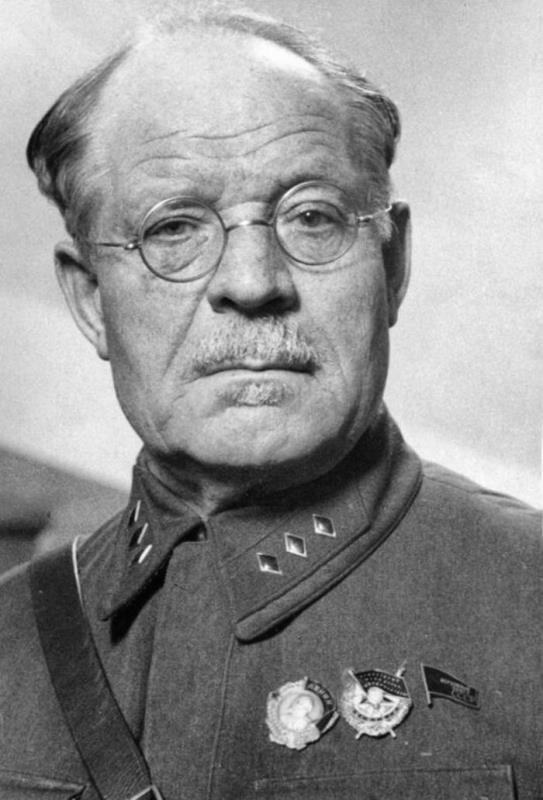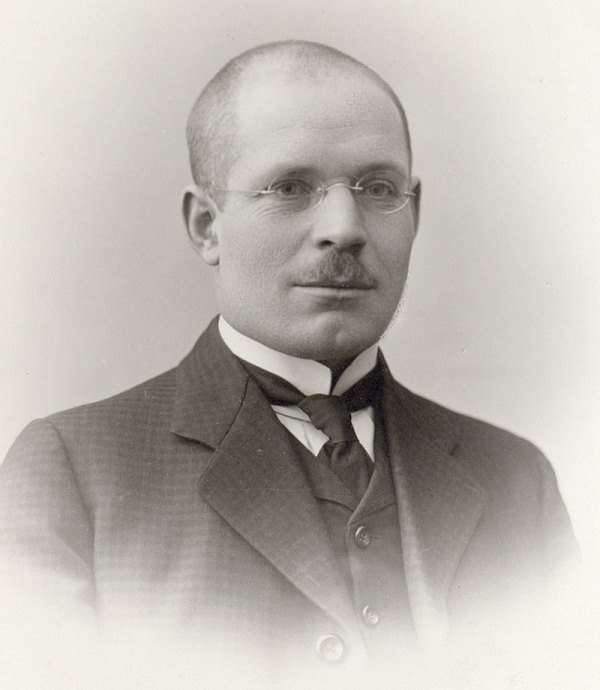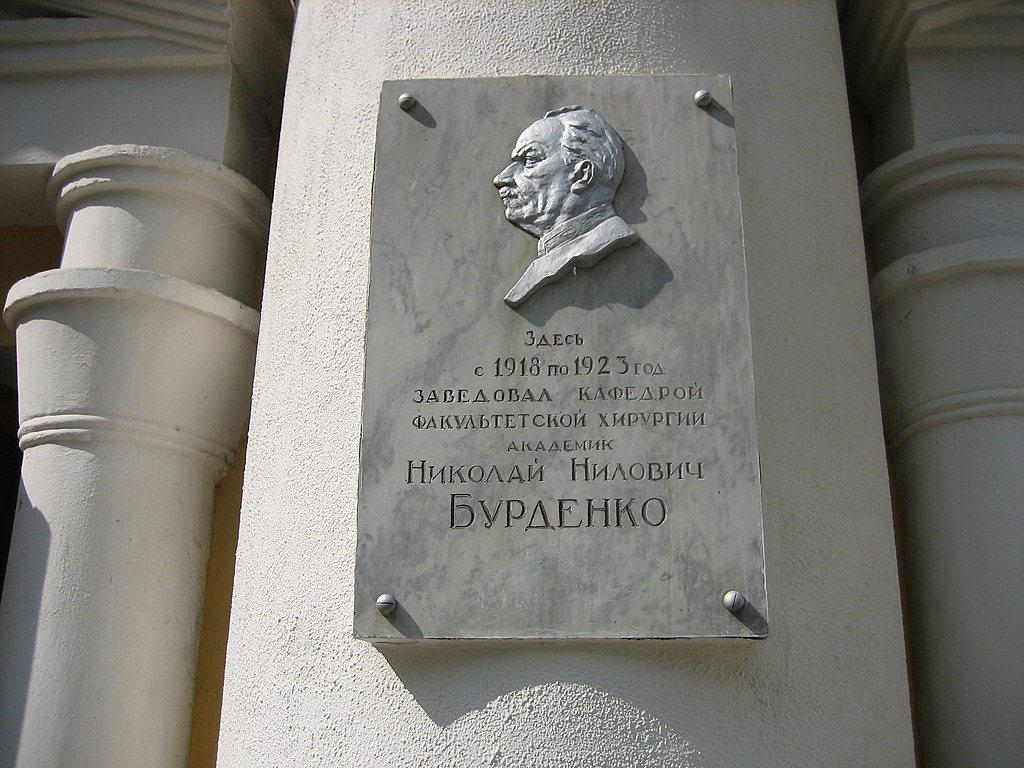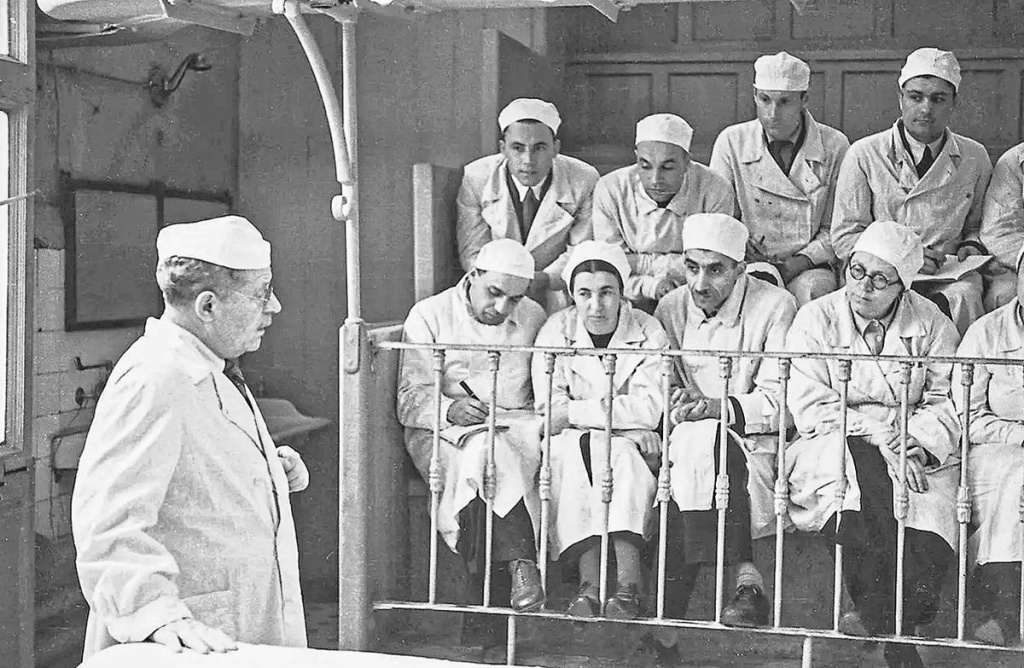
Proud of Our People! Nikolay Burdenko, the Founder of Soviet Neurosurgery
/ Главная / Russkiy Mir Foundation / Publications / Proud of Our People! Nikolay Burdenko, the Founder of Soviet NeurosurgeryProud of Our People! Nikolay Burdenko, the Founder of Soviet Neurosurgery
He was an internationally renowned brilliant surgeon, founder of the world's leading school of neurosurgery, reformer of national health care, and founder of the USSR Academy of Medical Sciences. Аour wars have shaped Nikolay Burdenko as high-level professional. He was a military surgeon, saving patients with nearly irremediable wounds. His name is now given not only to the Main Military Hospital in Moscow but also to the surgical techniques studied by the new generations of surgeons.
Healing bodies, not souls
Nikolay Burdenko was born in the village of Kamenka in Penza Governorate on May 22 (June 3, N.S.), 1876. His father, a serf who served as a clerk for a squireling, wanted his son to get a better education but not a secular one. He believed that religious education would provide a more successful career.

Nikolay Burdenko. Photo credit: wikimedia.org
First, the father was happy with his son. The five-year-old boy sought to join the local village school on his own. Having rejected the boy first, the teacher later gave in to his perseverance and permitted him to attend classes. After school, Nicholay joined the theology college and then the theological seminary in Penza. He had outstanding achievements in the seminary and was granted a reference letter to the St. Petersburg Theological Academy where he passed his exams with distinction. One would imagine that his career would be a spiritual one. Nevertheless, the talented young man unexpectedly changed his field. He wanted to heal mortal human bodies rather than human souls. His father could not forgive his son's "betrayal" and sent him an angry letter with stamps and a note in it: "Use them for a letter when you will be dying of starvation." He neither forgave his son nor wanted to see him again.
Survival rate of the wounded was improved many times over
The laws of Tsarist Russia forbade seminarians to study at secular educational institutions in the capital. So, Nikolay Burdenko went to Tomsk University where the Medical Department had just been opened. He quickly proved to be a very talented student. In his third year, Nikolay became a prosector's assistant. He used to spend a lot of time in the university's anatomy theater and enthusiastically helped students who were behind.
During those years Russia was experiencing the maelstrom of the revolutionary movement. There were student strikes and protests all over the country. Nikolay Burdenko participated in them as well. Consequently, the promising student was expelled due to his revolutionary activities. Having failed to be reinstated, Mr. Burdenko joined the University of Yuryev (currently the University of Tartu in Estonia). Yet, his views remained unchanged here as well and he was expelled once again after participating in another student rally.
They managed to ban him from university studies but not from medicine. Nikolay Burdenko, an undergraduate doctor, headed to Kherson Governorate where a typhus epidemic was raging. Then he worked in a colony for children with tuberculosis for almost a year. From that point on, his modus vivendi was to be in the heart of the pain and suffering where his help was vital.
In 1904, the Russo-Japanese War broke out. Nikolay Burdenko, a young doctor, volunteered to go to the front and became a member of a flying medical unit. His duties included taking the wounded out on the battlefield and giving them first aid as a paramedic. He also performed uncomplicated surgeries. Primary care was poorly organized at the front, which made a depressing impression on Nikolay Burdenko. From there on, the outstanding surgeon focused on making sure that wounded soldiers were treated as quickly and efficiently as possible.
Once the war was over, he passed the exams brilliantly and received a doctor's diploma with honors. Two years later he defended his thesis and was awarded the title of Doctor of Medicine. Having completed one year of training in German and Swiss clinics where he studied the brain's anatomy, Nikolay Burdenko returned to the Yuryev University Hospital. This is where he became an Extraordinary Professor of the Surgery Department.
However, Nikolay Burdenko again abandoned his well-organized life in August 1914. The First World War broke out he requested permission to go to the front. This time he was no longer an attendant or a paramedic but a well-known surgeon. Having joined the active army, he participated in the East Prussian Campaign and in the Battle of the Vistula River. More than 25,000 wounded were successfully evacuated from the battlefield through his efforts. Moreover, he often rendered urgent surgical aid right in the field dressing stations, thus, frequently being under fire. Yet, the most important thing was that the surgeon Nikolay Burdenko managed to improve the survival rate of the wounded many times over, which became a discussion topic among the military commanders.

Photo credit: ru.wikipedia.org
How did he accomplish this? Nikolay Burdenko drew many vital conclusions based on the lessons of the previous war. For instance, he sorted the wounded into those who would survive a long transport to the hospital and those who had to be treated right away. A lot of deaths were caused by abdominal wounds. Thus, special surgery units for abdominal, lung, and head wounds were arranged in military field hospitals under Nikolay Burdenko's supervision. He formed special teams of doctors to deal with hemorrhagic shock as the most severe and fatal complication of wounds. He also organized sanitary and anti-epidemic services and worked on chemical protection issues, and even the prevention of STDs. Having been shell-shocked in the summer of 1917, Nikolay Burdenko returned to the University of Yuryev.
The USSR: the global center of neurosurgery
The Revolution of 1917 caught him in Yuryev, which soon came under German occupation. The German army command offered Professor Burdenko the position of subdepartment head at the university but he refused. In June 1918, Mr. Burdenko and other professors of the Yuryev clinic came to Voronezh.
He immediately got engaged in the arrangement of military hospitals for the Red Army. He also organized special training in the field surgery for students and doctors at Voronezh University. Nikolay Burdenko established a school for nurses and taught there. In 1920, he initiated the foundation of Pirogov Medical Society in Voronezh and became its chairman. Today Voronezh State Medical University also bears the name of the outstanding surgeon Nikolay Burdenko.

Voronezh State Medical University. Memorial plaque to N. Burdenko. Photo credit: G. Lipunov/ ru.wikipedia.org
In 1923, Mr. Burdenko moved to Moscow and opened a neurosurgery department at the Moscow University Hospital. In 1930, that department was reformed into the 1st Moscow Medical Institute named after Ivan Sechenov. By that time Moscow had already become one of the world's leading centers of neurosurgery.
Nikolay Burdenko was the country's pioneer in performing surgeries on the brain, thanks to his impressive experience in military field surgery. Back then, such surgeries were rare anywhere in the world as surgeons feared to perform them. And yet, incurable patients were recovering after Mr. Burdenko's surgeries. Those who had lost sight due to brain tumors were able to see again. He actually developed brain tumor surgery from scratch. Doctors from Germany, France, and the United States attended the Soviet surgeon's master classes. Foreign patients were begging him to become his patients for surgeries.

N. Burdenko gives lecture for young doctors. Photo credit: pulse.mail.ru
“Life is worth living only when you work”
At the same time, his students and assistants remembered him as an extremely self-rigorous man. He was a tough and extremely demanding person to those around him. He insisted that the surgical nurses should understand what instrument the surgeon needed at any given moment without words and immediately put it into the open hand. He would get angry in the case of the slightest mistake or delay not to mention disarray or a dirty stain on a bed sheet in the hospital. According to the memories of his colleagues, he urged everyone to perform their medical duty to the utmost. It is no coincidence that a few days before his death he wrote in his diary: "Life is worth living only when you work, and if you don't work, you shouldn't live." This hard-edged note says it all.
At the time of the Soviet-Finnish War, Nikolay Burdenko was 64 years old. He went to the front again and was in charge of arranging surgical care for the whole period of the war. Consequently, in 1941, he was appointed the chief surgeon of the Red Army. In July of 1941, Mr. Burdenko was at the front. He performed thousands of surgeries in regimental and division medical battalions during the Great Patriotic War. Over those years, he suffered three strokes and was shell-shocked during a bombing. Nevertheless, he used to return to the duties of a military surgeon every time after his recovery.
It was reported that he refused to go into a bomb shelter during an air raid and said: "The wounded cannot hide. The doctor's duty is to be by the patient's bedside." The Soviet military medics achieved tremendous results. They managed to help recover 72.3% of the wounded and 90.6% of the sick soldiers, which equaled about 18,000,000 people. Moreover, the efforts of medical workers prevented outbreaks of infectious diseases and epidemics in the USSR during the war.
In December 1944, the Academy of Medical Sciences was opened in the Soviet Union. it was headed by Nikolay Burdenko. Furthermore, he wrote scientific papers on effective surgical treatment of combat injuries and elaborated detailed guidelines for the prevention and treatment of post-wound shock. He was a pioneer in using new antibiotics and formed a medical team to test them. Soon, he insisted on using penicillin in all military hospitals. He found an effective way to treat septic complications caused by head-wound surgery. One can say that Nikolay Burdenko established his school of experimental surgery. Several surgical methods are named after Mr. Burdenko as he discovered them.
He continued working till the last days of his life despite the fact that he had lost his speech and hearing and was almost unable to move as a result of three strokes. Still, he wrote an extensive article about gunshot wounds for the All-Union Congress of Surgeons in October 1946. He was elected honorary chairman of the Congress and the article was read by his student there. A month later Nikolay Burdenko passed away.
New publications

 Mikhail Kalatozov, a director who transformed the world of cinematography in many ways, was born 120 years ago. He was a Soviet film official and a propagandist. Above all, he was capable of producing movies that struck viewers with their power and poetic language.
Mikhail Kalatozov, a director who transformed the world of cinematography in many ways, was born 120 years ago. He was a Soviet film official and a propagandist. Above all, he was capable of producing movies that struck viewers with their power and poetic language.  Ukrainian authorities have launched a persecution campaign against the canonical Ukrainian Orthodox Church (UOC), the biggest one in the country's modern history. Over the past year, state sanctions were imposed on clergy representatives, searches were conducted in churches, clergymen were arrested, criminal cases were initiated, the activity of the UOC was banned in various regions of the country, and monasteries and churches were seized.
Ukrainian authorities have launched a persecution campaign against the canonical Ukrainian Orthodox Church (UOC), the biggest one in the country's modern history. Over the past year, state sanctions were imposed on clergy representatives, searches were conducted in churches, clergymen were arrested, criminal cases were initiated, the activity of the UOC was banned in various regions of the country, and monasteries and churches were seized.  When Nektary Kotlyaroff, a fourth-generation Russian Australian and founder of the Russian Orthodox Choir in Sydney, first visited Russia, the first person he spoke to was a cab driver at the airport. Having heard that Nektariy's ancestors left Russia more than 100 years ago, the driver was astonished, "How come you haven't forgotten the Russian language?" Nektary Kotlyaroff repeated his answer in an interview with the Russkiy Mir. His affinity to the Orthodox Church (many of his ancestors and relatives were priests) and the traditions of a large Russian family brought from Russia helped him to preserve the Russian language.
When Nektary Kotlyaroff, a fourth-generation Russian Australian and founder of the Russian Orthodox Choir in Sydney, first visited Russia, the first person he spoke to was a cab driver at the airport. Having heard that Nektariy's ancestors left Russia more than 100 years ago, the driver was astonished, "How come you haven't forgotten the Russian language?" Nektary Kotlyaroff repeated his answer in an interview with the Russkiy Mir. His affinity to the Orthodox Church (many of his ancestors and relatives were priests) and the traditions of a large Russian family brought from Russia helped him to preserve the Russian language.

 The leaders of the Friends of the Great Russia cultural association (Amici Della Grande Russia) in Italy believe that the Western policy of abolishing Russian culture in Europe has finally failed. Furthermore, it was doomed to failure from the beginning.
The leaders of the Friends of the Great Russia cultural association (Amici Della Grande Russia) in Italy believe that the Western policy of abolishing Russian culture in Europe has finally failed. Furthermore, it was doomed to failure from the beginning.  Name of Vladimir Nemirovich-Danchenko is inscribed in the history of Russian theater along with Konstantin Stanislavski, the other founding father of the Moscow Art Theater. Nevertheless, Mr. Nemirovich-Danchenko was a renowned writer, playwright, and theater teacher even before their famous meeting in the Slavic Bazaar restaurant. Furthermore, it was Mr. Nemirovich-Danchenko who came up with the idea of establishing a new "people's" theater believing that the theater could become a "department of public education."
Name of Vladimir Nemirovich-Danchenko is inscribed in the history of Russian theater along with Konstantin Stanislavski, the other founding father of the Moscow Art Theater. Nevertheless, Mr. Nemirovich-Danchenko was a renowned writer, playwright, and theater teacher even before their famous meeting in the Slavic Bazaar restaurant. Furthermore, it was Mr. Nemirovich-Danchenko who came up with the idea of establishing a new "people's" theater believing that the theater could become a "department of public education."  "Russia is a thing of which the intellect cannot conceive..." by Fyodor Tyutchev are famous among Russians at least. December marks the 220th anniversary of the poet's birth. Yet, he never considered poetry to be his life's mission and was preoccupied with matters of a global scale. Mr.Tyutchev fought his war focusing on relations between Russia and the West, the origins of mutual misunderstanding, and the origins of Russophobia. When you read his works today, it feels as though he saw things coming in a crystal ball...
"Russia is a thing of which the intellect cannot conceive..." by Fyodor Tyutchev are famous among Russians at least. December marks the 220th anniversary of the poet's birth. Yet, he never considered poetry to be his life's mission and was preoccupied with matters of a global scale. Mr.Tyutchev fought his war focusing on relations between Russia and the West, the origins of mutual misunderstanding, and the origins of Russophobia. When you read his works today, it feels as though he saw things coming in a crystal ball...